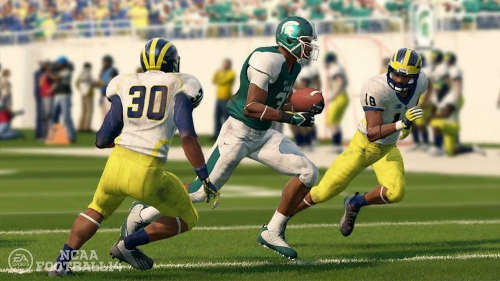Hearing Held to Determine Class Action Certification in Player Likeness Lawsuit

On Thursday judge Claudia Wilken heard arguments from both sides in the player likeness lawsuit that threatens the future operations of the NCAA, CLC, and Electronic Arts. A ruling is not expected for some time – it could be a matter of weeks or even months.
Questioning from the judge certainly appeared tougher on the plaintiffs. Wilken even told the lawyers that they must add a current college player to the case now if any are to end up in the class action suit later. That could be a difficult proposition as most athletes would not want to be singled out in such a manner while they continue their athletic competition and education.
The certification has been viewed as difficult for the plaintiffs to succeed in but if they did it would be a crushing blow that could lead to a settlement rather than going to trial. The NCAA contends the claims of athletes vary from individual to individual who would value their worth differently – there isn’t the required commonality – and because of that it should not be class action. If the certification request is denied it would be a huge win for the defendants who would only have to battle individual lawsuits rather than a pool of thousands and the monumental payout and changes that would have to be made going forward if the end result was not in their favor.
Here are some tweets from in the courthouse Thursday to paint a picture of what happened:
Interesting that judge is asking about stars vs. benchwarmers. One of the tests for class certification is commonality.
— Andy Staples (@Andy_Staples) June 20, 2013
Judge questioning plaintiffs as to the potential conflict of star athletes negotiating for bigger share of revenue than benchwarmers.
— Stewart Mandel (@slmandel) June 20, 2013
Onto the arguments on college athletes not getting paid for appearing in video games. Plaintiffs lawyer says NCAA sells rosters to Elec Arts
— Zusha Elinson (@ZushaElinson) June 20, 2013
Lawyer for EA and CLC says that because they are just following NCAA rules, there can be no antitrust claim against them
— Steve Berkowitz (@ByBerkowitz) June 20, 2013
That last RT is a telling statement. The NCAA and EA are not on the same team. Not good for NCAA.
— Andy Staples (@Andy_Staples) June 20, 2013
Significant moment. Judge asks plaintiffs why they have no current student as a named plaintiff to represent the class.
— Stewart Mandel (@slmandel) June 20, 2013
Attorney for plaintiffs says they could use a current student but fear retaliation by NCAA, want to discuss in private. Judge skeptical.
— Stewart Mandel (@slmandel) June 20, 2013
O'Bannon's lawyer says he wants athletes to be allowed to negotiate w. schools and video game companies. "That would be the marketplace"
— Zusha Elinson (@ZushaElinson) June 20, 2013
Judge suggests if a jury did not accept plaintiffs' plan of equal revenue for every athlete, the class would have to be decertified.
— Stewart Mandel (@slmandel) June 20, 2013
Earlier/Summary Below
The player likeness lawsuit against the NCAA, CLC, and Electronic Arts is the culmination of two high profile filings that were combined as led by Sam Keller and Ed O’Bannon (and O’Bannon now heads it up). It alleges improper use of player likeness through various forms of merchandise and media including video games in which the parties in question conspired to avoid paying players for their rights. Some interesting details and claims regarding the case at hand were revealed when EA was reentered as a defendant after initially being dismissed.
EA originally won a previous case regarding player likeness with the courts ruling video games are artistic works rather than commercial speech and therefore protected by the First Amendment. The Supreme Court in 2011 established forms of media, producing expressive works of art, are not subject to judgments based on incorporating someone’s name or likeness. That dismissed case however, involving Ryan Hart, has resurfaced after an appeals court reversed a decision based on that argument.
Recent uncovered emails have shown that NCAA representatives were well aware that players in games were based off real-life players. At one point the NCAA and EA had nearly reached an agreement to have actual player names included in the products. The EA Locker / Roster Share feature was a fallback option. With momentum clearly on the plantiffs’ side NCAA reps have begun to publicly express concern over the future of collegiate sports. A former EA Sports producer admitted players in NCAA games were based off real athletes.
The discovery of Tim Tebow’s name being in NCAA Football 10 could throw another wrench into EA’s series of arguments. Depositions from former Alabama wide receiver Tyrone Prothro and UConn basketball guard Tate George support the defendant’s reasoning for denying class action certification.
This consolidated case in California looks as though it will be going to trial and ultimately be the determining factor of how the NCAA proceeds in the future handling broadcasting rights, merchandising, and video games. Should a negative result come down, which one analyst has pegged as being a potential loss of $1 billion for EA, it would likely not just end the NCAA Football series but also with it any realistic possibility of college sports games being made in the future. The NCAA is currently seeking to block classification as class action. The trial now is slated to begin June 2014. Appeals following a decision could extend the fight through 2020.
